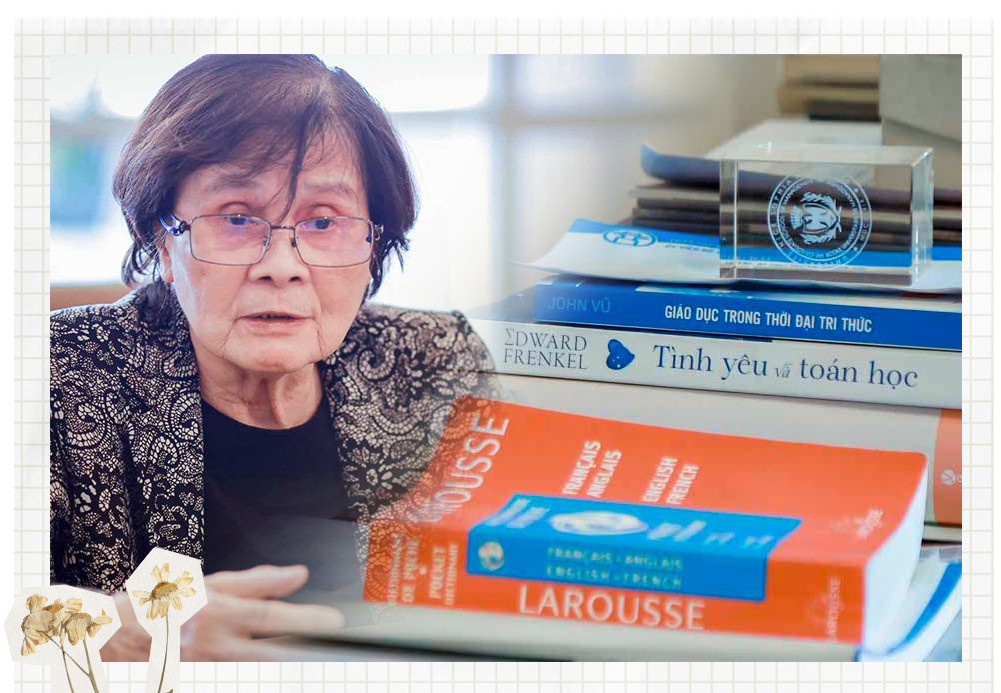
"At that time, asking for permission to establish a private university proved to be an impractical thing. Anything related to ‘private’ would be rejected. I told the Party Chief that I just wanted to set up a university, and I did not need the state’s money. And the Party Chief agreed to my proposal,” recalled Professor and Dr of Science People’s Teacher Hoang Xuan Sinh.
Sinh is a respected scientist in Vietnam, known as the first Vietnamese female mathematician. She was the first Vietnamese who successfully defended a dissertation overseas to obtain a doctorate in mathematics. She was also the person who met Party Committee Secretary General Nguyen Van Linh and founded the first Vietnamese private university in 1988.
I want to build a math system of a high level
Sinh decided to study mathematics after she just obtained her high school diploma. The reason was simple: patriotism.
“My father believed that when you love your country, you need to do something specific. To build the country, being good at natural sciences is a must,” she said.
She also chose to study math because this was the easiest subject for her.
Three months after obtaining a master’s degree in mathematics in France, she returned to Vietnam to devote herself to the fatherland.
The luggage she brought was two briefcases full of books.
At that time, she had three choices in working places and she chose the University of Education.
However, the facilities of the school were then very poor. There was electricity, but it was unsteady, and was not good enough to ensure teaching and learning.
“At that time, only teacher Nguyen Canh Toan had an associate doctor degree and I had a master's degree. Other lecturers had bachelor’s degrees (2-3-4-year training),” she recalled.
“We had 30 teaching hours a week. Lecturers had to be present at school every day. But no one complained about this, because we believed that we were doing this to build the country,” she said.
While giving lectures to students, Sinh and her colleagues had to continue to study by themselves.
Fortunately, Sinh received advice from French Professor Alexander Grothendieck, who was called the mathematics genius of the 20th century and received the Fields Medal in 1966.
In July 1975, her dissertation was successfully defended in France.
Once again, she decided to return to Vietnam to contribute to the development of the country’s education. She continued to devote herself to producing doctors, hoping that Vietnam could build a mathematics system at a high level which allowed mathematicians to study math without having to go abroad to defend their dissertations.
It was the 1980s when Vietnam had just finished the subsidy period and lecturers’ lives were facing difficulties. After teaching hours at school, many teachers had to earn a living by selling roasted peanuts and fried cakes.
One day, Prof Bui Trong Lieu, who was then a lecturer at Université Paris Descartes, sent a letter to five famous scientists in Vietnam, namely Prof Hoang Xuan Sinh, Prof Hoang Tuy, Prof Phan Dinh Dieu, Prof Nguyen Dinh Chi and Pro Bui Trong Luu, suggesting that the scientists join forces to establish a private university which would fix shortcomings in public schools.
Sinh decided to write a letter to the Ministry of University Education with the signatures of five scientists. However, they did not receive a reply.
Later, Sinh decided to visit directly the then Party Committee Secretary General Nguyen Van Linh.
In 1988, Thang Long University, the first private university in Vietnam, was established. The curriculum was designed by the school itself, not the commonly used one designed by the Ministry of Education and Training.
Sinh calculated the tuition by considering the price of rice. A state officer then could buy 13 kilograms of rice a month, while a university student could buy 15 kilograms. In a family, every two members had 10 kilograms of rice in excess, which they could sell for money to fund study. Therefore, Sinh decided that the tuition was equal to the value of 10 kilograms of rice.
However, tuition from students was not enough to develop the school. Having no money to pay cleaners, Sinh got up at 6am and did the work of a cleaner. Every professor was paid $5 per teaching hour and the money was donated by Vietnamese in France.
Later, she went to France to seek financial resources to maintain the school’s operation.
In 1994, when reviewing the private school model, the Ministry of Education and Training (MOET) said the model could satisfy the academic requirements, but said the model won’t be able to exist if it just relies on donations.
Thuy Nga